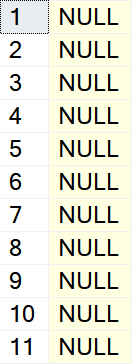Did you know that the CASE statement has a maximum nesting level of 10? The same limit exists for IIF() function which is just a syntactical sugar and is internally transformed into multiple CASE statements. I have prepared two samples you can play with it.
Let’s start with the query that is still working because the limit isn’t hit:
SELECT
ID,
CASE WHEN ID =1 THEN
CASE WHEN ID = 2 THEN
CASE WHEN ID = 3 THEN
CASE WHEN ID = 4 THEN
CASE WHEN ID = 5 THEN
CASE WHEN ID = 6 THEN
CASE WHEN ID = 7 THEN
CASE WHEN ID = 8 THEN
CASE WHEN ID = 9 THEN
CASE WHEN ID = 10 THEN 1 ELSE NULL END
ELSE NULL END
ELSE NULL END
ELSE NULL END
ELSE NULL END
ELSE NULL END
ELSE NULL END
ELSE NULL END
ELSE NULL END
ELSE NULL END Col1
FROM (VALUES ('1'), ('2'), ('3'), ('4'), ('5'),
('6'), ('7'), ('8'), ('9'), ('10'),
('11')) AS b (ID)

Don’t be surprised by the fact that we have 11 rows in the result set. We have the first CASE statement and then another 10 nested inside. You can see that the maximum ID we have used to check by CASE was 10.
Let’s go and modify the query to include another nested CASE statement for ID = 11:
SELECT
ID,
CASE WHEN ID =1 THEN
CASE WHEN ID = 2 THEN
CASE WHEN ID = 3 THEN
CASE WHEN ID = 4 THEN
CASE WHEN ID = 5 THEN
CASE WHEN ID = 6 THEN
CASE WHEN ID = 7 THEN
CASE WHEN ID = 8 THEN
CASE WHEN ID = 9 THEN
CASE WHEN ID = 10 THEN
CASE WHEN ID = 11 THEN NULL ELSE NULL END
ELSE NULL END
ELSE NULL END
ELSE NULL END
ELSE NULL END
ELSE NULL END
ELSE NULL END
ELSE NULL END
ELSE NULL END
ELSE NULL END
ELSE NULL END
FROM (VALUES ('1'), ('2'), ('3'), ('4'), ('5'),
('6'), ('7'), ('8'), ('9'), ('10'),
('11')) AS b (ID)
![]()
This time an exception was fired clearly saying that the internal limit of a maximum of 10 nested CASE statements was reached. So be careful and remember this limitation in your development especially when working with dynamically generated SQL where this error can occur only at specific data in the input.
For further reading, I will strongly recommend the article Dirty Secrets of the CASE Expression written by Aaron Bertrand for https://sqlperformance.com, mainly the section Simple CASE expressions can become nested over linked servers.
